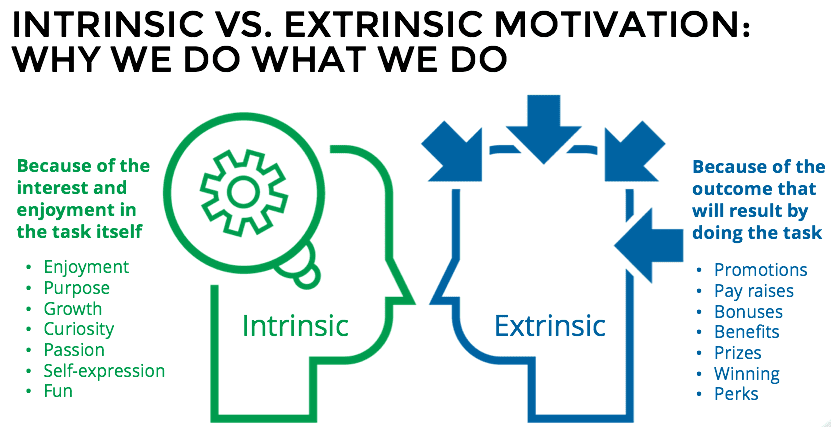
National Association of Christian Ministers Leadership Series
By Michael Mooney, Exec. Elder
Intrinsic rewards are the experiences of satisfaction after the internal drive toward specific goals. In other words, they are rewards (such as personal development, or achievement) linked
to performing job functions (Mahaney & Lederer, 2006).
Report
Michael Maccoby (2010) is the author of The Four Rs of Motivation. In this brief article he reviews the results of several findings of studies regarding the nature of intrinsic rewards. However more
specifically, he reviews some of his previous research on human motivation, and makes comparisons between personal experiences and research findings.
Four Rs
Maccoby (2010) offers an equation for motivation in the form of four intrinsic “Rs”:
1) responsibilities;
2) relationships;
3) rewards; and
4) reasons.
This formula finds validation in the test results of 150,000 people spanning over 100 countries.
Responsibilities-Relationships.
From the responsibilities element, it seems that people favorably enjoy intrinsic motivation by engaging challenges of their personal values. When responsibilities are in line with their core values, role satisfaction and appreciation reaches levels as high as 80%. The studies also show good relations with leadership to be the number one factor that defines a “good job”. Leadership further maximizes intrinsic motivation when good relations are combined with assigned tasks that complement member values.
Rewards-Reasons.
Interestingly, even in matters of rewards Maccoby’s (2010) report shows that extrinsic rewards are generally secondary to intrinsic ones. While compensation is indeed relevant to human motivation, the research demonstrates that approximately 85% of respondents will be satisfied with less pay in circumstances where they receive intrinsic rewards of recognition for their efforts. This links to the last of the Rs which is reasons. Maccoby (2010) claims this to likely the most powerful of them all. The author reports the reasons of purpose, philanthropy, and pride in sincere efforts are powerful intrinsic forces that motivate people to exhaust their greatest efforts.

Discussion
Spirituality
God places the intrinsic propensity toward eternity in the hearts of humanity (Ecc 3:11). This explains why “Spiritual Transcendence is a significant, universal, motivational quality that exists in all cultures” (Piedmont, 2007, p. 102). There are great applications for these insights within corporate, nonprofit, and religious organizations. Spirituality is becoming an increasing subject of modern business ethics as well as academia. Ironically, Kolodinsky, Giacalone, and Jurkiewicz (2008 ) find positive relationships with organizational spirituality in work environments. Often the results are increased organizational commitment and overall satisfaction –including compensation. Apparently, even non-spiritual employees also preference work environments structured by spiritual values.
Satisfaction in Purposes
As the previous authors, Byrd, Hageman, and Isle (2007) link deeply held spiritual values to attitudes, which inevitably shape behaviors –the moments when intrinsic and extrinsic factors become observable reality. These findings prove most effective in environments where spirituality is cultural or organizational, as opposed to individual. Additionally they find a distinct difference between religiously and secularly based intrinsic pursuits for rewards. The distinction is that spirituality offers the intrinsic reward of purposes in life, more so than work or other activities. Yet even more interesting is the connection between spiritual purposes and the intrinsic rewards of work activities. The results show that physical work and spiritual purposes are complementary to each other -even more so than spirituality and leisure. Experiential satisfaction is the summation of these rewards, and when members encounter this, even customers receive increased levels of satisfaction with their services (Mahaney & Lederer, 2006). Therefore, “the establishment of a spiritual climate through modeling servant leadership, open communication, and valuing individual differences will go a long way to affecting worker perceptions and attitudes” (Kolodinsky et al., 2008, p. 476).
Questions to consider:
If you are a minister leading in a church setting:
What are the intrinsic motivators of people who follow the Lord?
What type of intrinsic rewards does God promise to those who serve Him?
How do the Four Rs fit within the context of ministry?
If you are a manager leading in a secular setting:
How can spiritual values be incorporated into the daily operations of the organization’s purpose and goals?
How can spiritual values be utilized in such a way that brings attention to Jesus that still complies with organizational policy?
How can you identify member’s values and link them to intrinsic rewards?
References
Byrd, K., Hageman, A., & Isle, D. (2007). RESEARCH: Intrinsic Motivation and Subjective
Well-Being: The Unique Contribution of Intrinsic Religious Motivation. International Journal for the Psychology of Religion, 17(2), 141-156. doi:10.1080/10508610701244155.
Kolodinsky, R., Giacalone, R., & Jurkiewicz, C. (2008 ). Workplace values and outcomes:
Exploring personal, organizational, and interactive workplace spirituality. Journal of Business Ethics, 81(2), 465-480. doi:10.1007/s10551-007-9507-0.
Maccoby, M. (2010). The 4 RS id Motivation. Research Technology Management, 53(4), 60-61.
Retrieved from Business Source Complete database.
Mahaney, R., & Lederer, A. (2006). The effect of intrinsic and extrinsic rewards for developers on information systems project success. Project Management Journal, 37(4), 42-54. Retrieved from Business Source Complete database.
Piedmont, R. (2007). Cross-cultural generalizability of the Spiritual Transcendence Scale to the
Philippines: Spirituality as a human universal. Mental Health, Religion & Culture, 10(2), 89-107. doi:10.1080/13694670500275494.




